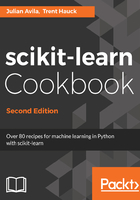
About the Authors
Julian Avila is a programmer and data scientist in the fields of finance and computer vision. He graduated from the Massachusetts Institute of Technology (MIT) in mathematics, where he researched quantum mechanical computation, a field involving physics, math, and computer science. While at MIT, Julian first picked up classical and flamenco guitar, machine learning, and artificial intelligence through discussions with friends in the CSAIL lab.
He started programming in middle school, including games and geometrically artistic animations. He competed successfully in math and programming and worked for several groups at MIT. Julian has written complete software projects in elegant Python with just-in-time compilation. Some memorable projects of his include a large-scale facial recognition system for videos with neural networks on GPUs, recognizing parts of neurons within pictures, and stock market trading programs.
Special thanks to MIT professor emeritus Robert Rose, who was very encouraging in regards to writing this particular machine learning book. I would also like to thank professors Seth Lloyd and Peter Shor for introducing me to computations of a probabilistic nature, the many-worlds that might be of quantum mechanics; Dr. Paul Bamberg for teaching statistics (although I took a geometry class from him) and Dr. Michael Artin for his humor and geometric algebra knowledge. Finally, I would like to thank Dr. Yuri Chernyak who taught me a lot about problem solving.
I would like to thank Packt for writing (and helping me write) very direct and practical books. I would also like to thank the Python community and their philosophies. Python is a very welcoming and elegant language, particularly effective for solving very tough problems and fine-tuning requirements very fast. I would like to thank you in advance for reading this book and pushing the data science frontier further with scikit-learn.
Trent Hauck is a data scientist living and working in the Seattle area. He grew up in Wichita, Kansas and received his undergraduate and graduate degrees from the University of Kansas.
He is the author of the book Instant Data Intensive Apps with pandas How-to, by Packt Publishing—a book that can get you up to speed quickly with pandas and other associated technologies.